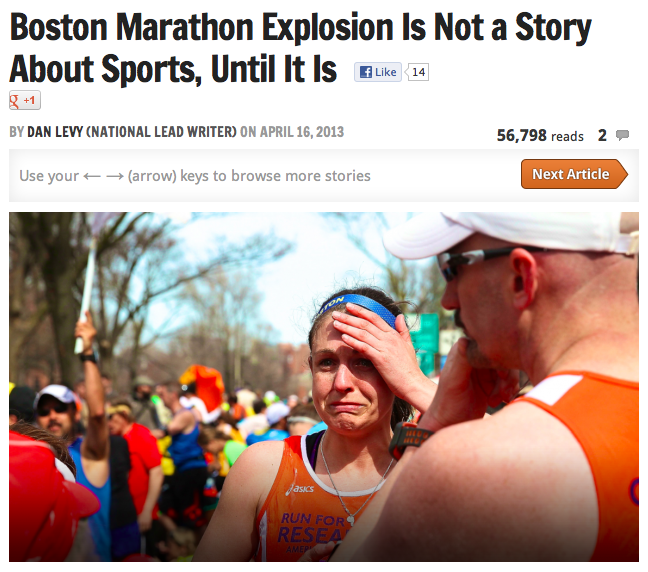When the news of the Boston Marathon broke, I was sitting outside my journalism class. I opened my computer to check Twitter and other news sites, trying to figure out what was going on. For the next hours, I was glued to my computer and the television, trying to figure out what was going on. So for this week's blog post, I wanted to see how the Detroit Free-Press covers the event a week later and how it compares to national news sites.
Immediately, the lead story on the Free-Press's homepage is a column about the Boston Marathon. Mitch Albom writes about the many instances he has experienced with danger and terror, from an East German translator who cannot enter a hotel strictly for foreigners, to having to sit away from windows in a Detroit neighborhood for fear of being shot. Albom discusses that the events of the marathon reminds us terror can strike us at any place, at any time, but we cannot be scared of it or let it define us. It's the same argument of people being scared of flying because of the crashes. Yes, occasionally planes do crash, but the odds of it happening are very small. The same can be said for bombings at sporting events.
This column reminded me of a column Marquette alumnus Steven Rushin wrote on the day the Boston Marathon bombings happened. He wrote of the last day of his daughter's summer vacation, when just he and her went to Boston for the day. He took her to her first Red Sox game and they were able to get a photo at the finish line of the Boston Marathon. That photo was sitting at Rushin's desk when he saw the footage of the bombings and when he was writing the column. It's a moving piece that has little to do with the actual events of the bombings, and is more of a reflective piece on what really matters in life.
Later Sunday night, I returned to the Free-Press's website, and the lead story was about Dzhokhar Tsarnaev being awake and responsive at a Boston hospital. The story went over the state of Tsarnaev at the hospital, and that officers were briefly investigating whether his neck injury was self-inflicted or not. Officials also said Tsarnaev was in no condition to talk thoroughly to police officers because his condition just recently stabilized.
One story I also found on the Free-Press website was a story about runners in the Lansing marathon. It was the story of two Chicagoans, Derek Bergey and Reyna Gonzalez. The couple saw what happened on Boston, and signed up for the soonest and nearest marathon. So on Sunday, they ran a half marathon wearing shits that said "For Boston" on the front and "The only thing we have to fear is fear itself" on the back. This was a common theme for runners, as many paid some form of homage, whether it was tapping the American flag at the beginning of the race, wearing blue and yellow clothes or even one man who wore a name tag with each fallen spectator on it. I found the response from the sporting world to be the best out of all venues in the past week.
On Bleacher Report, National Lead Writer Dan Levy talks about how the Boston Marathon wasn't about sports. The idea behind the bombing had nothing to do with the marathon, except for the venue. But, it was much more than that. Sports provides for an escape for people, leaving behind a world of politics and conflict. It's the hometown good guys versus the away bad guys. Sports provide an outlet for people to sit down and enjoy something perfect. The bombings violated the sanctity of sporting events.
If you need any proof that the city of Boston will not let the bombings define them, just watch the video of the national anthem at Bruins home game against the Buffalo Sabres. Look at David Ortiz's pre-game speech before the Red Sox faced the Kansas City Royals. But it was also a national event. The crowd at Scottrade Center in St. Louis erupted at the news of suspect 2's arrest in a game between the Blues and Dallas Stars. In a post-9/11 world, the United States is desensitized to these kinds of acts of violence. But the works of Albom, Rushin and Levy show that the Boston Marathon is an important history marker in the U.S.'s life. There's an old saying that journalism is the first draft of history, and the columns above show journalism isn't dead. Instead, they show journalism is more important than ever.
Immediately, the lead story on the Free-Press's homepage is a column about the Boston Marathon. Mitch Albom writes about the many instances he has experienced with danger and terror, from an East German translator who cannot enter a hotel strictly for foreigners, to having to sit away from windows in a Detroit neighborhood for fear of being shot. Albom discusses that the events of the marathon reminds us terror can strike us at any place, at any time, but we cannot be scared of it or let it define us. It's the same argument of people being scared of flying because of the crashes. Yes, occasionally planes do crash, but the odds of it happening are very small. The same can be said for bombings at sporting events.
This column reminded me of a column Marquette alumnus Steven Rushin wrote on the day the Boston Marathon bombings happened. He wrote of the last day of his daughter's summer vacation, when just he and her went to Boston for the day. He took her to her first Red Sox game and they were able to get a photo at the finish line of the Boston Marathon. That photo was sitting at Rushin's desk when he saw the footage of the bombings and when he was writing the column. It's a moving piece that has little to do with the actual events of the bombings, and is more of a reflective piece on what really matters in life.
Later Sunday night, I returned to the Free-Press's website, and the lead story was about Dzhokhar Tsarnaev being awake and responsive at a Boston hospital. The story went over the state of Tsarnaev at the hospital, and that officers were briefly investigating whether his neck injury was self-inflicted or not. Officials also said Tsarnaev was in no condition to talk thoroughly to police officers because his condition just recently stabilized.
One story I also found on the Free-Press website was a story about runners in the Lansing marathon. It was the story of two Chicagoans, Derek Bergey and Reyna Gonzalez. The couple saw what happened on Boston, and signed up for the soonest and nearest marathon. So on Sunday, they ran a half marathon wearing shits that said "For Boston" on the front and "The only thing we have to fear is fear itself" on the back. This was a common theme for runners, as many paid some form of homage, whether it was tapping the American flag at the beginning of the race, wearing blue and yellow clothes or even one man who wore a name tag with each fallen spectator on it. I found the response from the sporting world to be the best out of all venues in the past week.
On Bleacher Report, National Lead Writer Dan Levy talks about how the Boston Marathon wasn't about sports. The idea behind the bombing had nothing to do with the marathon, except for the venue. But, it was much more than that. Sports provides for an escape for people, leaving behind a world of politics and conflict. It's the hometown good guys versus the away bad guys. Sports provide an outlet for people to sit down and enjoy something perfect. The bombings violated the sanctity of sporting events.
If you need any proof that the city of Boston will not let the bombings define them, just watch the video of the national anthem at Bruins home game against the Buffalo Sabres. Look at David Ortiz's pre-game speech before the Red Sox faced the Kansas City Royals. But it was also a national event. The crowd at Scottrade Center in St. Louis erupted at the news of suspect 2's arrest in a game between the Blues and Dallas Stars. In a post-9/11 world, the United States is desensitized to these kinds of acts of violence. But the works of Albom, Rushin and Levy show that the Boston Marathon is an important history marker in the U.S.'s life. There's an old saying that journalism is the first draft of history, and the columns above show journalism isn't dead. Instead, they show journalism is more important than ever.


 RSS Feed
RSS Feed